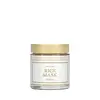I'm from Rice Sheet Mask Versus I'm from Rice Mask
What's inside
What's inside
 Key Ingredients
Key Ingredients

 Benefits
Benefits

 Concerns
Concerns

No concerns
 Ingredients Side-by-side
Ingredients Side-by-side

Oryza Sativa Extract
AbsorbentWater
Skin ConditioningMethylpropanediol
SolventNiacinamide
SmoothingCetyl Ethylhexanoate
EmollientCaprylic/Capric Triglyceride
MaskingHydrogenated Poly(C6-14 Olefin)
EmollientPolyglyceryl-6 Stearate
EmollientDipropylene Glycol
HumectantSorbitan Stearate
EmulsifyingHydroxyacetophenone
AntioxidantArginine
MaskingCarbomer
Emulsion StabilisingPolyglyceryl-6 Behenate
Emulsion StabilisingCaprylyl Glycol
EmollientXanthan Gum
EmulsifyingAdenosine
Skin ConditioningEthylhexylglycerin
Skin Conditioning1,2-Hexanediol
Skin ConditioningBetaine
HumectantSodium Hyaluronate
HumectantPanthenol
Skin ConditioningSqualane
EmollientDipotassium Glycyrrhizate
HumectantTocopherol
AntioxidantPantolactone
HumectantDisodium EDTA
Oryza Sativa Extract, Water, Methylpropanediol, Niacinamide, Cetyl Ethylhexanoate, Caprylic/Capric Triglyceride, Hydrogenated Poly(C6-14 Olefin), Polyglyceryl-6 Stearate, Dipropylene Glycol, Sorbitan Stearate, Hydroxyacetophenone, Arginine, Carbomer, Polyglyceryl-6 Behenate, Caprylyl Glycol, Xanthan Gum, Adenosine, Ethylhexylglycerin, 1,2-Hexanediol, Betaine, Sodium Hyaluronate, Panthenol, Squalane, Dipotassium Glycyrrhizate, Tocopherol, Pantolactone, Disodium EDTA
Water
Skin ConditioningGlycerin
HumectantDipropylene Glycol
HumectantOryza Sativa Powder
Cetearyl Ethylhexanoate
EmollientOryza Sativa Hull Powder
Abrasive1,2-Hexanediol
Skin ConditioningBeeswax
Emulsion StabilisingSynthetic Wax
AbrasiveStearic Acid
CleansingBetaine
HumectantCetyl Alcohol
EmollientButyrospermum Parkii Butter
Skin ConditioningHydrogenated Poly(C6-14 Olefin)
EmollientCentella Asiatica Extract
CleansingFicus Carica Fruit Extract
HumectantOryza Sativa Bran Extract
Skin ConditioningOryza Sativa Extract
AbsorbentLaminaria Japonica Extract
Skin ProtectingEclipta Prostrata Leaf Extract
Skin ConditioningUlmus Davidiana Root Extract
Skin ConditioningAmaranthus Caudatus Seed Extract
Skin ConditioningHydrogenated Lecithin
EmulsifyingPalmitic Acid
EmollientSorbitan Stearate
EmulsifyingGlyceryl Stearate
EmollientSodium Polyacrylate
AbsorbentDimethicone
EmollientCyclopentasiloxane
EmollientAcetophenone
MaskingEthylhexylglycerin
Skin ConditioningWater, Glycerin, Dipropylene Glycol, Oryza Sativa Powder, Cetearyl Ethylhexanoate, Oryza Sativa Hull Powder, 1,2-Hexanediol, Beeswax, Synthetic Wax, Stearic Acid, Betaine, Cetyl Alcohol, Butyrospermum Parkii Butter, Hydrogenated Poly(C6-14 Olefin), Centella Asiatica Extract, Ficus Carica Fruit Extract, Oryza Sativa Bran Extract, Oryza Sativa Extract, Laminaria Japonica Extract, Eclipta Prostrata Leaf Extract, Ulmus Davidiana Root Extract, Amaranthus Caudatus Seed Extract, Hydrogenated Lecithin, Palmitic Acid, Sorbitan Stearate, Glyceryl Stearate, Sodium Polyacrylate, Dimethicone, Cyclopentasiloxane, Acetophenone, Ethylhexylglycerin
 Reviews
Reviews

Ingredients Explained
These ingredients are found in both products.
Ingredients higher up in an ingredient list are typically present in a larger amount.
1,2-Hexanediol is a synthetic liquid and another multi-functional powerhouse.
It is a:
- Humectant, drawing moisture into the skin
- Emollient, helping to soften skin
- Solvent, dispersing and stabilizing formulas
- Preservative booster, enhancing the antimicrobial activity of other preservatives
Betaine is a common humectant (a substance that promotes retention of moisture). It's known to be gentle on the skin and can help balance hydration.
This ingredient is best for improving hydration and soothing irritated skin. Studies also show it helps even out skin tone.
Fun fact: Betaine is naturally created in the skin and body. The kind found within cosmetic products can be either plant-derived or synthetic.
Another name for betaine is trimethylglycine.
Learn more about BetaineDipropylene Glycol is a synthetically created humectant, stabilizer, and solvent.
This ingredient helps:
Dipropylene glycol is technically an alcohol, but it belongs to the glycol family (often considered part of the ‘good’ alcohols). This means it is hydrating and gentle on skin unlike drying solvent alcohols like denatured alcohol.
As a masking agent, Dipropylene Glycol can be used to cover the smell of other ingredients. However, it does not have a scent.
Studies show Dipropylene Glycol is considered safe to use in skincare.
Learn more about Dipropylene GlycolEthylhexylglycerin (we can't pronounce this either) is commonly used as a preservative and skin softener. It is derived from glyceryl.
You might see Ethylhexylglycerin often paired with other preservatives such as phenoxyethanol. Ethylhexylglycerin has been found to increase the effectiveness of these other preservatives.
We don't have a description for Hydrogenated Poly(C6-14 Olefin) yet.
Oryza Sativa Extract comes from the rice grain, Oryza sativa. Rice extract has wound healing, antioxidant, anti-inflammatory, and hydrating properties.
Rice grains contain numerous antioxidants which may help with anti-aging, such as vitamin E. Antioxidants help stabilize free-radical molecules. Unstable free-radical molecules may damage your skin cells and accelerate signs of aging.
A study from 2002 found rice to help increase the rate of wound healing. The same study found an improvement of skin barrier function in the patients after taking rice baths.
Numerous in-vitro studies have found rice water to help decrease sun damage by increasing collagen production and inhibiting the process of tyrosinase.
Long story short- tyrosinase is an enzyme that controls melanin production. Our bodies start producing melanin (AKA tanning) when exposed to UV radiation to protect against damage. Rice water is found to partially block this process.
Though more research is needed on rice's ability to help with UV protection, recent studies seem promising.
Wondering why rice is hydrating? The protein in rice have emollient properties. Emollients create a barrier on the skin to trap moisture in, keeping your skin moisturized.
Some rice extract may have mildly-exfoliating properties. These are mainly limited to Oryza Sativa (Rice) Bran and Oryza Sativa (Rice) Germ Powder.
This rice was first cultivated in China over 10,000 years ago. Many cultures throughout Asia have used rice water on skin and hair for centuries.
Learn more about Oryza Sativa ExtractSorbitan Stearate comes from sorbitol and stearic acid. Sorbitol is a type of sugar and stearic acid is a fatty acid.
It is used as an emulsifier and helps ingredients stay together by creating water-in-oil emulsions.
This ingredient may not be Malassezia folliculitis, or fungal-acne safe.
Water. It's the most common cosmetic ingredient of all. You'll usually see it at the top of ingredient lists, meaning that it makes up the largest part of the product.
So why is it so popular? Water most often acts as a solvent - this means that it helps dissolve other ingredients into the formulation.
You'll also recognize water as that liquid we all need to stay alive. If you see this, drink a glass of water. Stay hydrated!
Learn more about Water